
Aristaloe is a genus of evergreen flowering perennial plants in the family Asphodelaceae from Southern Africa. Its sole species is Aristaloe aristata, known as guinea-fowl aloe or lace aloe.
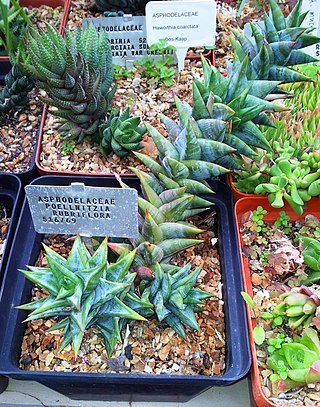
Astroloba rubriflora is a succulent plant found in the mountainous Karoo area around Robertson, South Africa. It is listed as a Vulnerable species on the IUCN global Red List.

Astroloba is a genus of flowering plants in the family Asphodelaceae, subfamily Asphodeloideae, native to the Cape Province of South Africa.

Tulista is a small genus of succulent plants endemic to the Cape Provinces of South Africa. They were formerly included within the genus Haworthia.
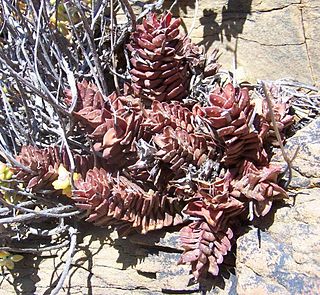
Astroloba bullulata is a small succulent plant of the Astroloba genus, endemic to mountainous areas of the southern Cape, South Africa.

Astroloba corrugata is a small succulent plant of the Astroloba genus, endemic to the Little Karoo and the far south of the Western Cape, South Africa.

Astroloba spiralis is a small succulent plant of the Astroloba genus, endemic to the southern Karoo regions of the Western and Eastern Cape Provinces, South Africa.
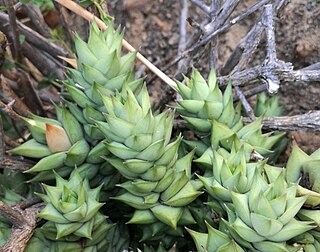
Astroloba herrei is a small succulent plant of the genus Astroloba, restricted to the area around the Swartberg mountains, South Africa.

Astroloba congesta is a small succulent plant of the Astroloba genus, indigenous to the Eastern Cape, South Africa.

Astroloba foliolosa is a small succulent plant of the genus Astroloba widespread in the arid parts of the Eastern Cape Province, South Africa.

Kumara is a genus of two species of flowering plants in the subfamily Asphodeloideae, native to the Western Cape Province of South Africa.

Haworthiopsis viscosa, formerly Haworthia viscosa, is a species of flowering succulent plant from the Western and Eastern Cape Provinces, South Africa.
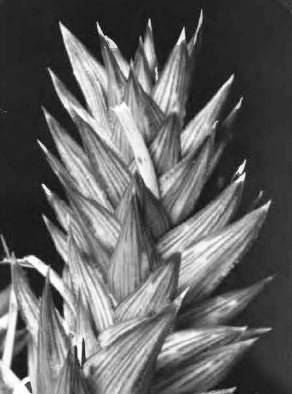
Astroloba pentagona is a small succulent plant of the genus Astroloba, restricted to an area of the western section of the Little Karoo, South Africa.

Astroloba robusta is a small succulent plant of the genus Astroloba indigenous to the arid southern Cape regions of South Africa. It is the most widespread Astroloba species.

Tulista pumila ("Vratjiesaalwee") is a species of Tulista succulent plant, from the Western Cape, South Africa.
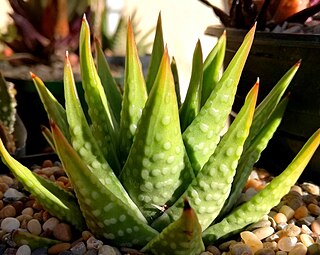
Tulista kingiana is a species of succulent plant, from the Western Cape, South Africa. It is listed as Endangered on the IUCN global Red List.

Tulista minor is a species of succulent plant, from the far south of the Western Cape, South Africa.

Astroloba tenax is a succulent plant of the genus Astroloba, indigenous to the Western Cape Province, South Africa.

Gonialoe is a small genus of three succulent plant species—Gonialoe dinteri, Gonialoe sladeniana and Gonialoe variegata—endemic to coastal South Africa, Namibia and Angola. They were formerly included within the larger, related genus Aloe.

Aloeae is a tribe of succulent plants in the subfamily Asphodeloideae of the family Asphodelaceae, consisting of the aloes and their close relatives. The taxon may also be treated as the subfamily Alooideae by those botanists who retain the narrower circumscription of Asphodelaceae adopted prior to the APG III system. Typically, plants have rosettes of more or less succulent leaves, with or without a distinct stem. Their flowers are arranged in racemes and tend to be either small and pale, pollinated by insects, or larger and more brightly coloured, pollinated by birds. As of 2017, 11 genera are recognized, most created since 2010 by splitting off another five genera from Aloe and another two from Haworthia. Only two genera, Aloe and Aloidendron, are native outside southern Africa, extending northwards to the Arabian Peninsula. Seven genera are restricted to South Africa, some with small ranges. Members of the Aloeae are cultivated by succulent plant enthusiasts; Aloe species especially are used in temperate climates as ornamental garden plants. Some species are used in traditional medicine. Aloe vera and Aloe ferox are cultivated for their extracts, whose uses include moisturizers and emollients in cosmetics.




















